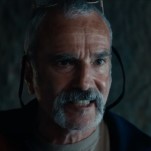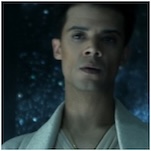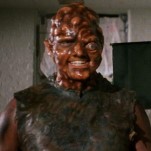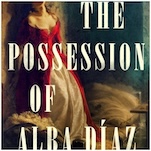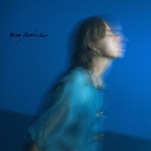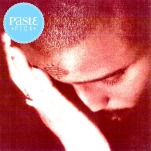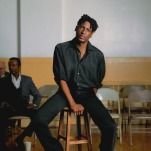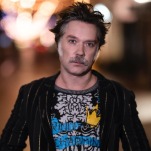“People Have the Power”: Patti and Fred “Sonic” Smith’s Dream-Come-True Prayer for Our Times
Photo by Jason Kempin/Getty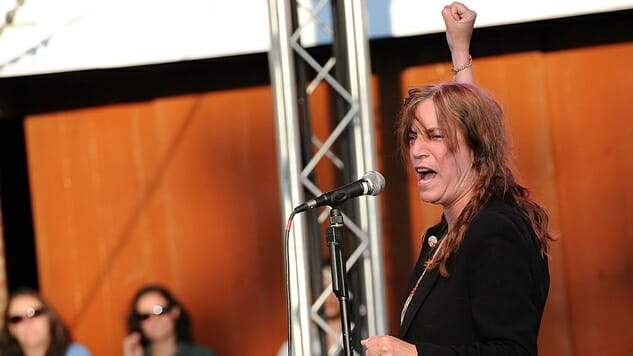
On International Women’s Day 2017, Patti Smith’s second-to-last song of the night at Northrop Auditorium in Minneapolis was “People Have The Power,” her better-than-ever 30-year-old tune-poem that plays more like a mantra and prayer than protest anthem, and which had the sold-out crowd of 2,700 this night singing the chorus out loud or with their inside voices—in the moment, the next day, and/or into the weekend.
Me? I was all in on the chorus, which stuck with me as an unshakable earworm and mantra, especially as I read about the ACLU’s new “People Power” initiative over the weekend.
As the Lenny Kaye-led band brought her anthem of the resistance and persistence to an acoustic crash, Smith raised her right hand in a fist. Then, to the sound of cascading drums and with the soul-killing backdrop of Trump issuing executive orders restricting the rights of immigrants, women and media outlets, Smith let the strains of “People Have The Power” ring through the hall and pointedly bellowed to all the punks and people and hippies and humans assembled: “Don’t forget it! USE YOUR VOICE.”
USE YOUR VOICE. Given how quickly times are changing, I’m pretty sure every soul in the joint needed the reminder—and it wasn’t the first time Smith has been doing the reminding. For years now she’s been imploring audiences with the same edict at the end of “People Have The Power,” including recent performances at Democracy Now!’s 20th anniversary celebration, and at Smith’s 70th birthday party—both in December. She dutifully repeats it—“Don’t forget it! USE YOUR VOICE”—to the point where now it’s part of the song and a staple of the encore on stops across the globe on her current “Horses” tour.
My senses newly opened
I awakened to the cry
That the people have the power
To redeem the work of fools
Upon the meek the graces shower
It’s decreed the people rule
This night, the ruling people’s reaction hardly achieved the chant-along euphoria of protest music lore, but instead came with more of a subdued sigh, perhaps because we’ve been bludgeoned by the Matrix, the behavior of our fellow human beings and a certain audacity of hopelessness. So, even as our queen decreed that we the people not forget that we have the power to use our voices to speak truth to power, the question hung in the chilly Minnesota March air:
“Do you still believe the people have the power?” professor Bill Kelly asked Smith at the City University in New York in 2009. “I always believe that,” she said. “I think that they don’t know that, I don’t think they believe that, and I understand why they don’t believe that, because it’s getting harder and harder and harder to penetrate the walls that are built, the corporate walls. I mean, the Bush administration built such impenetrable walls, it’s like Obama is just chipping away with an ice pick.”
“It’s hard to keep heart and keep protesting and keep using your voice, but we have to do that. Ralph Nader told me a long time ago that we have to be ready to not win when we go out and protest our government, or protest war, or protest Con Edison or whoever else needs to be protested against. We have to be willing to lose, and lose, and lose, but to make certain that we are counted—that the opposition, or the people who are oppressing us, know that we exist. To be a thorn in their side and keep poking, and poking, and poking ‘til finally they bleed.”
“People Have The Power” was released on Smith’s 1988 album Dream Of Life, recorded at a time when the Iron Curtain was coming down in the former Soviet Union, Reagan-Bush was waging its war on drugs and embroiled in the Iran-Contra affair, British prime minister Margaret Thatcher delivered her infamous and Brexit-foreshadowing Bruges speech, thousands of anti-government protesters were murdered in Burma/Mayanar, the Iran-Iraq War ended with a truce and over one million dead, the first student protests in Beijing over Chinese martial law that would lead to the Tiananmen Square Massacre the following year began, and the first stirrings of the people-powered World Wide Web hooked up its first two links and survived its first computer virus.
All of which feels quaint, or stupidly similar, compared to the here and now of the here and now. “Our generation thought we could change the world through love and revolution, and we got Donald fucking Trump!” Smith screamed in Minneapolis. She sang “Citizen Ship,” an evergreen that embraces refugees and bridge—not wall-building—that concluded with her arms wide open as if she was every immigrant cast out to sea and her plaintively howling, “Lady liberty, lend a hand to me, I’ve been cast adrift… adrift… adrift…”
She dedicated “Ghost Dance” to “the brothers and sisters of Standing Rock,” and wore a red ribbon in honor of International Women’s Day, saying, “We salute everyone who marched today, everyone who took to the streets, and everyone who couldn’t, but felt it in their heart. I know I shouldn’t be working today, but Horses is beyond gender.” Then, after shredding the strings of her guitar during the night’s rabid closer, “My Generation,” she laughed, “I hope I LIVE ‘til I get old! Donald Trump is 70, but so fucking am I! Now is the time for us to misbehave. We must misbehave in a loving way.”
-

-

-

-

-

-

-

-

-

-

-

-

-

-

-

-

-

-

-

-

-

-

-

-

-

-

-

-

-

-

-

-

-

-

-

-

-

-

-

-

















